If you are looking for solutions to expand your business operations or functionality, competitive intelligence tools may be an ideal choice tools that can help your business grow in many aspects. For instance, they can help you analyze and interpret competitor data, market trends, industry developments, and much more.
Additionally, the competitor analysis tools can also offer several strategic insights for your business. For example, you can refer to competitors’ strategy, tactics, client sentiment, pricing, and asset offerings. Moreover, business intelligence solutions mainly helps you by staying ahead of the market changes, alongside identifying various advantages and risks.
In this blog, we will talk about the top 10 competitor tracking tools and their benefits, pricing, and best features, alongside how you can choose the perfect competitive tool for your company.
What Is Competitive Intelligence tools?
You can mainly refer to market intelligence software or CI or All SMO Tools as a process for gathering, inspecting, and using data on your competitors, market trends, and the external business infrastructure. The competitive intelligence procedure mainly leverages these facilities to encourage strategic decision-making in your organization.
Moreover, it also helps your business comprehend the activity of its competitors, the progress of the market, and actions for gaining or maintaining a competitive edge. For instance, here are some key factors of competitive intelligence:
Data Gathering
Competitive intelligence can collect information from legal and public sources, such as:
- Product releases and competitor websites.
- Commercial reports.
- Social media and customer reviews.
- Market research reports.
- Press releases and news articles.
Market Analysis
The competitive intelligence process can turn raw information into meaningful insights by:
- Detecting trends or patterns in the market.
- Comparing marketing strategies, pricing, and products.
- Calculating the weaknesses, strengths, and opportunities of your competitor.
Tactical Application
Competitive intelligence mainly uses several market insights for various factors, such as:
- Improving product development or marketing tactics.
- Anticipating the moves of your competitor.
- Entering new markets or adjusting pricing.
- Supporting sales and executive teams for decision-making.
Why Competitive Intelligence tools Matters in 2025?
competitive data analytics or CI has become more crucial than ever in 2025. There are many factors that are responsible for driving the significance of this process. For instance, you can refer to technology disruptions, market dynamics, and enhanced global competition. Nonetheless, here are some points you can follow:
Acceleration of Market Shift
There are several digital facilities, such as AI, automation, intergovernmental changes, and digital transformation,that are responsible for changing the market movement.
Moreover, competitive intelligence can help your company keep pace with the ongoing trends and adapt different strategies for staying ahead of the competition.
Technical Innovation And Disruption
Several risk technologies, such as quantum computing, GenAI, Web3, etc that are constantly shifting the value of market propositions. Also, by leveraging competitor monitoring platforms, it can assist your business in monitoring your competitor’s Research and development, patents, and tech partnerships.
Intergovernmental Risk And Globalization
In 2025, several companies are facing enhanced international competition, supply chain risks, and regulatory uncertainty. Moreover, Competitive Intelligence (CI) can help these companies navigate these problems by providing various benefits.
For instance, they are mainly local market insights, supply chain visibility, intergovernmental intelligence, and many more.
Competitive Intelligence Techniques
While going through the topic of competitive intelligence, there are many techniques it uses to help your business analyse both internal and external market factors. Moreover, here are some points you can refer to:
SWOT Analysis
The SWOT analysis technique is crucial in competitive intelligence for mainly breaking down your competitor’s strengths, weaknesses, and threats. Moreover, it generally points out several vulnerabilities of your competitor, such as poor customer service and legacy systems.
Furthermore, it can also indicate the strength of your competitor by highlighting their various facilities, such as customer loyalty, exclusive tech, and strong brands.
Competitor Benchmarking
The following procedure mainly includes the systematic measurement of your company against your competitor across different KPIs ( Key Performance Indicators). Moreover, you can also follow these points:
- Marketing effectiveness.
- Operational efficiency.
- Brand positioning.
- Asset features.
- Pricing models.
- Client satisfaction.
Also, in competitive intelligence, the procedure mainly works by going through several steps such as identifying key competitors, choosing metrics for comparison, collecting data, analyzing and visualizing, etc.
Market Trend Monitoring
Market trend observation or monitoring is a crucial technique for Competitive Intelligence, which focuses on detecting and inspecting changes in various market activities.
For instance, you can refer to customer behaviour, industry dynamics, regulatory environments, and technology, which can have an impact on your market. Moreover, the market trend monitoring can also have various aspects of your business, such as:
- Industry directions.
- Product relevance.
- Go-to-market plans.
- Strategies of your competitor.
- Expectations of your customers.
Social Listening
Among all the techniques of Competitive Intelligence, social listening is also among the top strategies. This technique is an efficient CI (Competitive Intelligence) strategy that mainly involves observation of several factors. For example, you can refer to online conversations, mentions, engagement, etc.
Moreover, this technique mainly utilizes its observation strategies across social media and digital platforms for gaining concurrent insights on different factors, such as:
- Market Sentiment.
- Customers.
- Industrial Trends.
- Competitors.
Website Traffic And Keyboard Tracking
While looking for CI or Competitive Intelligence techniques, website traffic and keyboard tracking are other noteworthy strategies for helping you uncover the online visibility of your competitor.
The following technique mainly analyzes various factors such as SEO keywords, top-performing keywords, and web traffic sources for uncovering facilities such as:
- Driving factors for your competitor’s growth.
- The investment areas of your competitor.
- Optimal strategies for competing against them.
For more insights, explore a detailed list of AI SEO tools that can help improve your search performance.
10 Best Competitive Intelligence Tools in 2025
Competitive intelligence tools have a variety of features and benefits you can apply in your business. Moreover, you have to choose the right tool that aligns perfectly with your business goals. Nonetheless, here are some examples of the top 10 competitive intelligence tools in 2025:
1. SEMrush
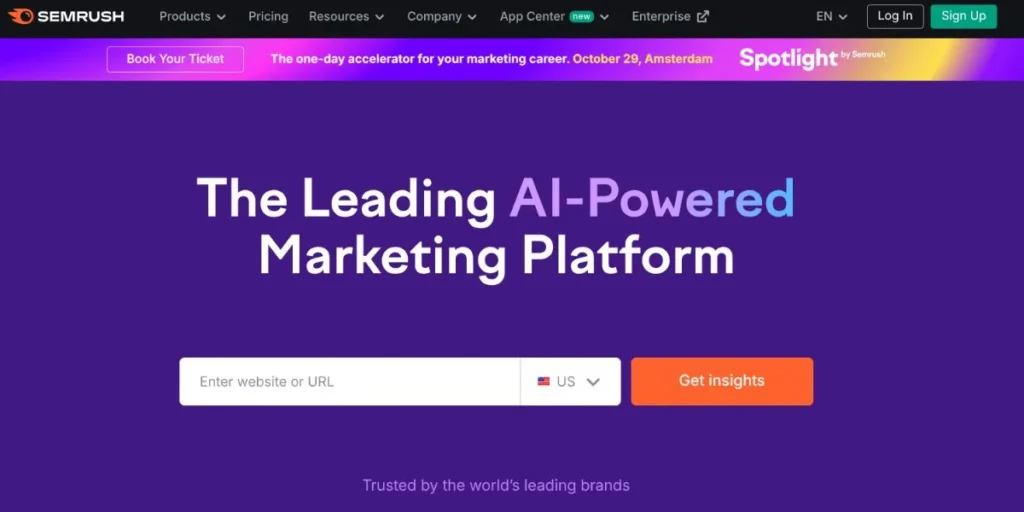
At the top of our suggestions, we can recommend the SEMrush facility, which is highly popular among users for its SEO facilities. It is mainly a vast SaaS platform that offers various tools for SEO, PPC, content marketing, etc.
By using this facility, users can inspect their competitors’ backlink profiles, website audits, domain visibility, top-performing keywords, and much more.
Key Features
- It can analyse both paid and organic keywords for spotting gaps and benefits.
- It can help you get a snapshot of your competitor metrics, such as search rankings, traffic, etc.
- You can also visualize the organic and paid search share of your domain by using this tool.
Pros And Cons
Pros
- You can integrate SEO, brand monitoring, traffic analytics, and PPC under a single platform.
- There are vast competitor insights, such as backlink comparison, market share, keyword gap, etc.
- You can also find several AI and automation features like trend analysis, content tools, automated competitor tracking, etc.
Cons
- The toolsets and the interface of this platform may overwhelm beginners.
- You generally have to pay for the advanced features.
- There are restrictions on concurrent syncing capabilities.
Price
- Pro: $139.95 per month.
- Guru: $249.95 per month.
- Business: $499.95 each month.
Website: https://www.semrush.com
2. Similar Web
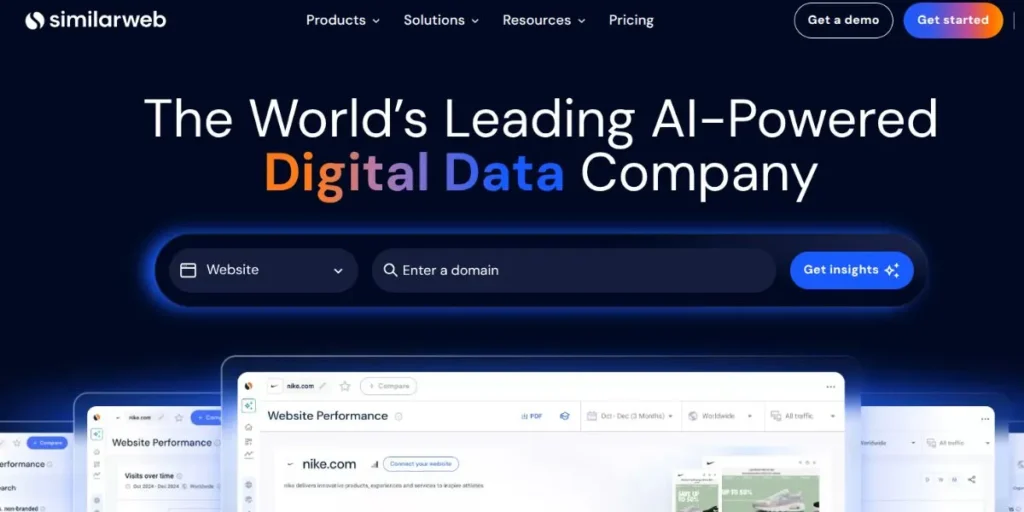
At the second position in our list, there is another noteworthy suggestion of a business growth tools, which is the Similar Web facility. It is generally a digital intelligence platform that specializes in various market factors.
For instance, you can refer to web and app analytics, market research, and competitor benchmarking across facilities like PPC, SEO, traffic, and audience insights.
Key Features
- It can track factors such as engagement metrics, traffic sources, etc.
- You can compare your digitalperformancee such as traffic metrics, user behaviour, keyword strategies, etc.
- The tool includes various SEO and PPC facilities like keyword research, paid search strategy, and detailed SERP analysis.
Pros And Cons
Pros
- The platform has clean dashboards and a user-friendly interface.
- It is ideal for detecting competitive gaps and identifying performance.
- The tool can also help you evaluate the market changes.
Cons
- Solo users may find it difficult to afford the tool.
- Data estimation may greatly vary for low-traffic and niche websites.
- It has several advanced features that can confuse various users.
Price
- Starter: $199 per month.
- Professional: $333 to $499 per month.
- Team: $14,000 each year.
- Business: $35,000 per annum.
Website: https://www.similarweb.com
3. Crayon
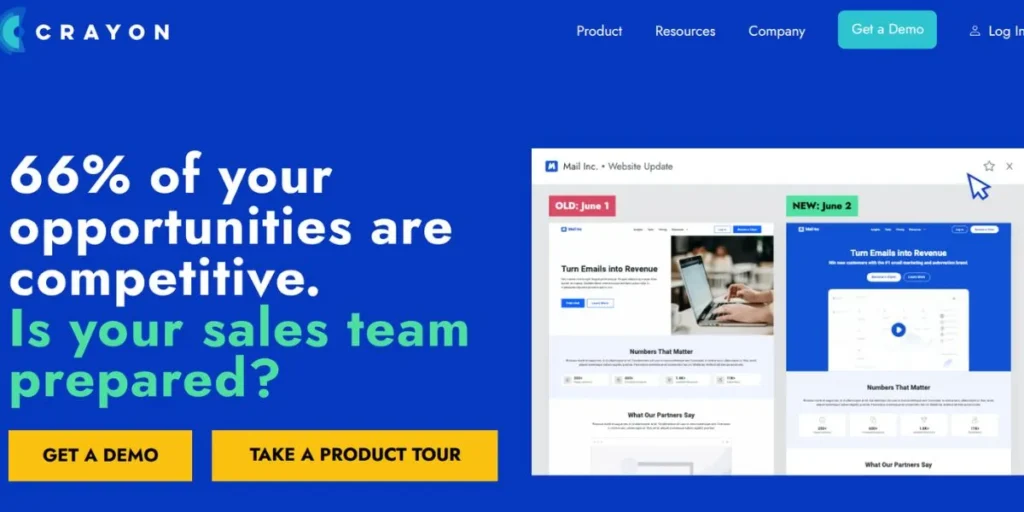
Coming up next, you can also follow the Crayon facility as one of the best competitive intelligence tools. This facility is mainly an enterprise-level competitive intelligence solution for helping your organization to centralize concurrent competitor tracking activity.
Also, this facility mainly extracts data from various sources such as reviews, pricing, sales, marketing, social media, and many more.
Key Features
- It can observe changes across sources like campaigns, pricing, websites, etc.
- It can create dynamic and personalized battlecards.
- You can integrate this facility with platforms like Microsoft Teams, Slack, Chorus, etc.
Pros And Cons
Pros
- It can provide you with extensive data collection from a broad array of digital sources.
- You can leverage enterprise-level scalability with unlimited tracking, users, etc.
- The tool can offer you an efficient workflow incorporation with various collaboration tools and CRM.
Cons
- There are various issues regarding the scalability performance.
- You may experience probable data overloads.
- There are also gaps in several research sources.
Price
- Not publicly available.
Website: https://www.crayon.co
4. Klue
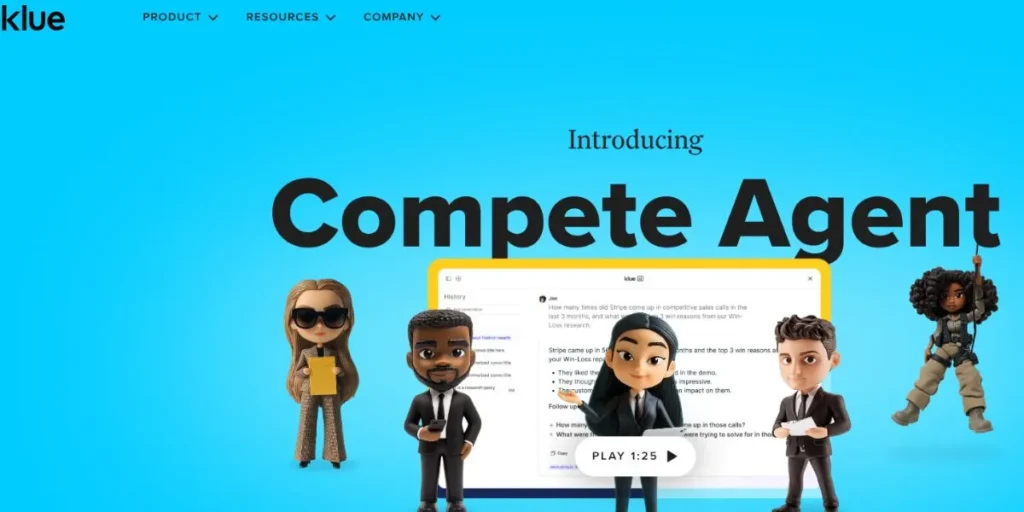
There are a variety of competitive intelligence tools on the internet, et and one of them is Klue. You can generally refer to it as a centralised intelligence platform that can automate various facilities.
For instance, it can automate the analysis, collection, and contribution of competitive insights.
Key Features
- The tool gathers its data from social media, websites, reviews, etc.
- You can find various AI-powered triage and review insights.
- It can create battlecards that are ideal for deals, competitors, and different market scenarios.
Pros And Cons
Pros
- You can find several efficient sales enablement tools.
- It has a user-friendly interface, which is also ideal for collaboration.
- You can flawlessly integrate with platforms like Salesforce, Slack, Teams, etc.
Cons
- It mainly relies on public sources for gathering data.
- You might face various AI and concurrent limitations with this tool.
- The entire setup procedure may require a lot of resources.
Price
- $16,000 per annum.
Website: https://klue.com
5. Owler
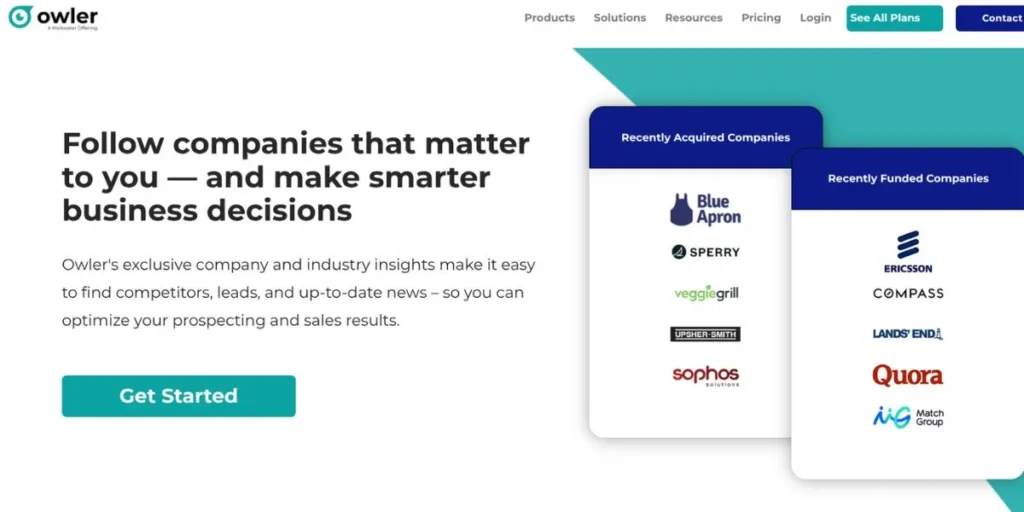
If you are looking for competitive intelligence tools for enhancing your business profitability, the Owler facility might be an ideal option for you. This platform is generally a community-based and competitive intelligence facility that can offer concurrent insights to your company.
Moreover, the platform is mainly ideal for both enterprises and startups. It can also aggregate cross-sourced data to cover your company updates and competitor relationships.
Key Features
- You can access various information about your company, such as revenue, employee counts, funding history, etc.
- It can offer daily snapshots and alerts for triggers like mergers, funding, and many more.
- You can key makers for supporting outreach efforts and sales.
Pros And Cons
Pros
- The tool is a budget-friendly option for many users.
- The facility has a user-friendly interface that encourages a clean design and simplistic navigation.
- It has a strong coverage for both private and public organizations.
Cons
- The platform often provides inaccurate information to its users.
- You may find the overboard alterations too generalized.
- Various people often struggle with the user interface.
Price
- Pro: $39 per month.
Website: https://corp.owler.com
To strengthen your brand image further, you can check out this list of business reputation management tools.
6. BuzzSumo
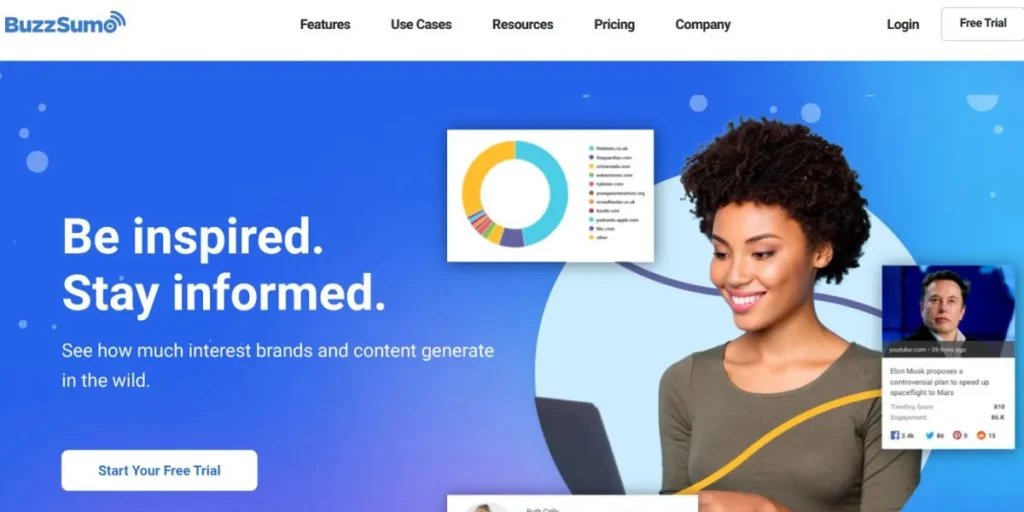
While going through several options for competitive intelligence tools, tuzzSumo is an ideal choice for expanding your business. It is mainly a content intelligence platform that is ideal for various professions.
For instance, these individuals and organisations are mainly content marketers, SEO experts, social media groups, PR experts, and many more.
Key Features
- It can help you discover trending content and inspect various engagement metrics.
- You can find high-performing content across domains, topics, detailed metrics, etc.
- You can also detect your competitor’s activity online.
Pros And Cons
Pros
- It is highly effective for researching content.
- The tool can provide you with various influencer and journalist insights.
- The platform is famous for its intuitive dashboard.
Cons
- The platform is a budget-friendly option for many low-budget companies.
- Many users might find the user interface a little bit complex.
- There are several restrictions on the platform and niche.
Price
- Content Creation: $199 per month.
- PR and Comms: $299 per month.
- Suite: $499 each month.
- Enterprise: $999 per month.
Website: https://buzzsumo.com
7. ZoomInfo
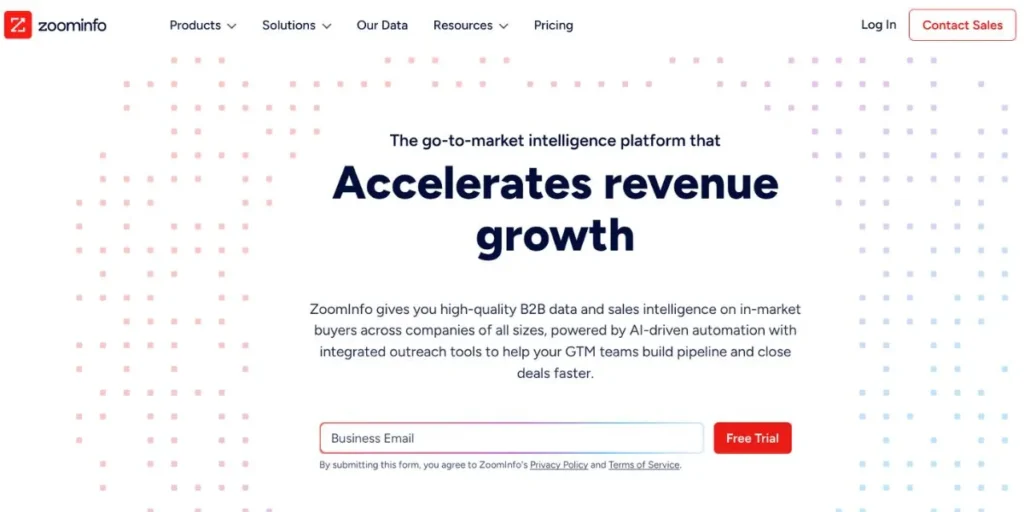
There are a lot of competitive intelligence tools you can find in the market, and only a few of them are reliable. For example, you can also refer to the ZoomInfo facility as a leading B2B intelligence platform.
The platform is highly popular for delivering up-to-date contact and organisation data. Moreover, it also supports facilities like marketing, sales, recruiting, and many more.
Key Features
- You can gain access to millions of verified expert and company profiles.
- It can identify companies that show purchasing signals and gain insights.
- There are several advanced search and filtering capabilities on this platform.
Pros And Cons
Pros
- The tool can offer you high-quality B2B insights.
- There is an extensive feature set that includes enabling cross-platform prospect targeting.
- The platform is also scalable for teams, with strong integrations and enterprise-ready modules.
Cons
- Several users may find the premium subscription a little bit expensive.
- The platform has a credit-based cost structure, which includes actions like data exports and credit consumption.
- You can also experience various support and quality issues.
Price
- Professional: $15,000 to $18,000 per year.
- Advanced: $25,000 to $30,000 per annum.
- Elite: $35,000 to $40,000+ each year.
Website: https://www.zoominfo.com
8. Sprout Social/ Brandwatch
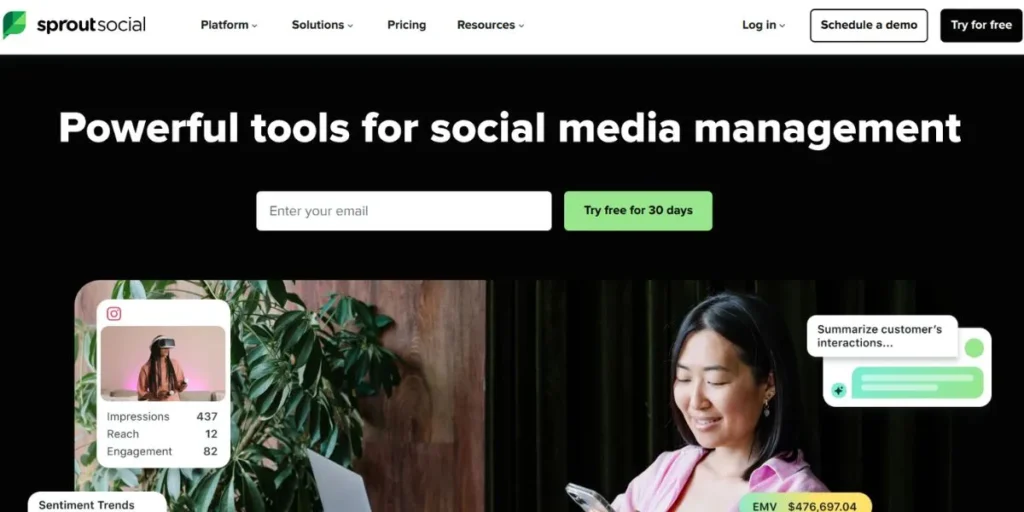
If you are looking for reliable digital marketing intelligence tools in the market, the Sprout Social or Brandwatch platform might be a perfect choice for you. It is generally a comprehensive social media management platform that operates by combining several facilities.
Moreover, some of the facilities generally include features like scheduling, engagement, and collaboration with various influencer tools and optional social listening.
Key Features
- You can find Smart Inbox across different platforms.
- There are various listening and sentiment analyses through the add-ons.
- Several analytics and reporting features include custom dashboards, trend tracking, crisis alerts, and many more.
Pros And Cons
Pros
- The intuitive interface of the platform is generally ideal for team collaboration.
- It has transparent subscription pricing.
- It can offer direct competitive insights, personalized reports, and crisis detection.
Cons
- The listening features mainly require expensive add-ons.
- The platform is not a budget-friendly option for small enterprises.
- The facility lacks various deep analysis features.
Price
- Standard: $199 per month.
- Professional: $299 per month.
- Advanced: $399 each month.
Website: https://sproutsocial.com
9. Kompyte
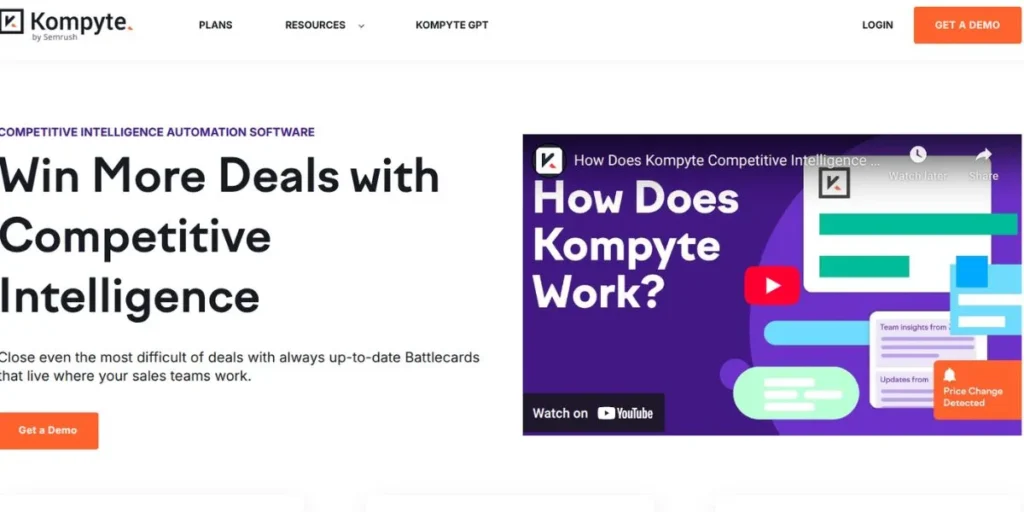
Coming up next, we can suggest another valuable option for a competitive intelligence tool, and it is the Kompyte platform. This tool is mainly a part of the SEMRush ecosystem, which functions as a concurrent competitive intelligence platform.
The facility is famous for various features such as marketing, product groups, and sales groups. The tool generally automates observation of your competitor activities alongside capturing updates from various sources like websites, ads, social media, etc.
Key Features
- The tool offers you various automated cross-channel observation capabilities.
- You can measure factors like win rates, revenue impact, and battle card effectiveness of your competitor.
- There are also various personalized dashboards and reporting functions.
Pros And Cons
Pros
- It has a visual and intuitive interface with personalized dashboards.
- There are multiple automation features.
- You can discover visible insights that are available for 24 to 48 hours.
Cons
- You can only export data from public channels.
- The data accuracy may also vary on this platform.
- There are no options for transparent pricing.
Price
- Starting: $299 to $499 per month.
- Enterprise-Level: $999 per month.
Website: https://www.kompyte.com
10. Google Alerts
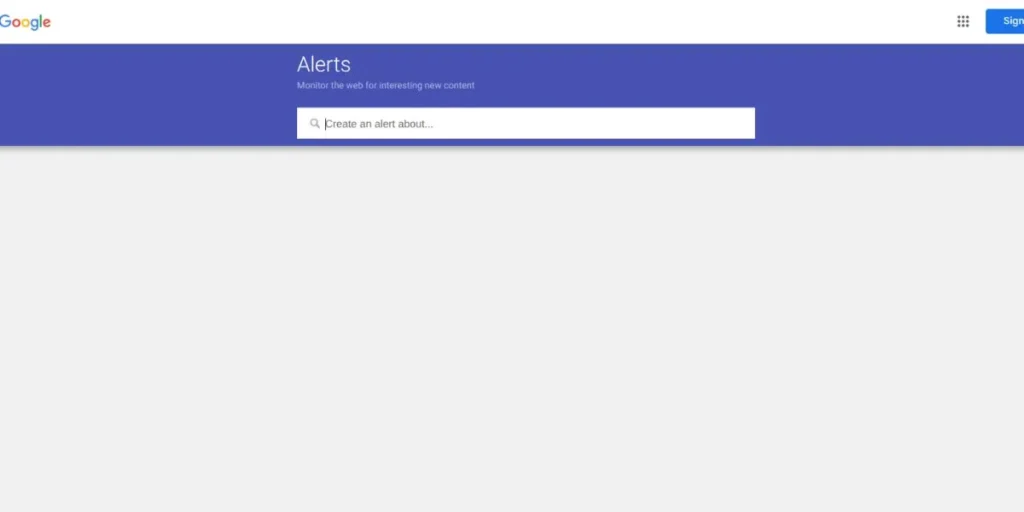
At the end of our list, we will recommend Google Alerts as one of the reliable competitive intelligence tools. You can mainly refer to it as a free service for web observation and functions as a notification platform. There are also various features like source filtering, wide web coverage, etc.
Key Features
- It can set alerts for words, competitors, and topics for keyword-based observation.
- There are various sour,ces filtering and frequency facilities.
- Google can observe areas like news websites, blogs, forums, and many more.
Pros And Cons
Pros
- The platform is completely free to use.
- You can effortlessly set up this platform for its user-friendly interface.
- It is mainly ideal for initial monitoring for competitor mentions and brand observation.
Cons
- Several users have reported delays and missed alerts.
- You may find that the alerts often include spammy and irrelevant results.
Price
- Free to use.
Website: https://www.google.co.in › alerts
How to Do Competitive Intelligence (Step-by-Step)?
If you want to conduct Competitive Intelligence or CI, there are several steps you have to follow, such as:
- Defining your objectives, such as whether your competitor is performing better than you.
- Identifying your key competitors that are direct, indirect, aspirational, or disruptive competitors.
- Selecting several aspects to monitor, such as marketing, product, customer, web presence, financials, hiring, and many more.
- Gathering intelligence from various legal sources like web traffic and SEO, social listening, competitive content, job postings, etc.
- Analyzing and interpreting through various ttechniquesSWOT analysis and competitor benchmarking.
Competitive Intelligence Best Practices
If you want to make an impactful competitive intelligence, it mainly needs to be strategic, action-driven, and ethical. Moreover, here are some points you can follow:
- Aligning Competitive Intelligence with your business goals by focusing on the strategic priorities.
- Tracking the right competitors that are not just the biggest names.
- Implementing a variety of legal sources, like company websites and blogs, review platforms, investor reports, and many more.
- Maintaining legal and ethical standards by following acceptable sources such as public data, publicly accessible social media content, and data from sales or customers.
Common Mistakes to Avoid
While conducting efficient Competitive Intelligence, there are several common mistakes you should avoid, such as:
- Tracking too many competitors with limited sources.
- Collecting data without any clear objectives.
- Ignoring internal intelligence sources.
- Failing to act on Insights.
- Implementing risky or illegal practices or strategies.
- Not updating your intelligence regularly.
- Ignoring the rising competitors and startups.
- Relying heavily on a single data source.
In Conclusion
Competitive intelligence tools are crucial assets if your business is thriving in a competitive and dynamic marketplace. The tools mainly encourage your organization by offering concurrent insights and actionable data on your market competitors and marketplace.
These tools can provide various features such as identifying market movements, revealing new opportunities, benchmarking performance, and many more. These features are important for encouraging your company to evaluate changes, decrease risks, and stay ahead of your competitors.
FAQs
Why do you need competitive intelligence tools for your business?
You generally require competitive intelligence tools for your business to leverage facilities like gathering and interpreting data on your competitors, market conditions, industry trends, etc.
Where do the competitive Intelligence tools gather their data?
The competitive intelligence tools generally gather their data from sources like websites, social media, news articles, job postings, commercial reports, and many more.
Can you benefit from using competitive intelligence tools?
Yes, you can benefit from implementing the competitive intelligence tools as they usually provide insights on product development, marketing campaigns, and pricing strategies, which can have an overall impact on your business growth.
What are some of the best Competitive Intelligence tools you can find?
Some of the best Competitive Intelligence tools mainly include SEMRush, SimilarWeb, Crayon, Klue, BuzzSumo, Owler, ZoomInfo, and many more.
